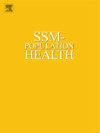Shadows in the Air: Mental health vulnerabilities under PM10 and PM2.5, before and after COVID-19
IF 3.1
2区 医学
Q1 PUBLIC, ENVIRONMENTAL & OCCUPATIONAL HEALTH
引用次数: 0
Abstract
Air pollution is an increasing public health concern, with evidence indicating that poor air quality adversely affects health through various pathways. However, its impact on mental health remains underexplored despite indications of pollutant-induced distress. This study examines the causal relationship between air pollution and mental health disorders—such as depression, sleep disorders, ADHD, and OCD—in South Korea. Assessing this relationship is challenging due to the simultaneous occurrence of economic growth, rising stress, and worsening air quality. Additionally, mental health issues have risen despite declining pollution levels post-COVID-19, further complicating the analysis. To address these challenges, we use wind speed and direction as instrumental variables. Our results show significant adverse effects of air pollution on mental health, particularly before 2020. Although the impact diminishes post-pandemic with improved air quality, certain demographic groups remain vulnerable. This study underscores the need for policies safeguarding mental health in at-risk groups, regardless of declining average pollution levels, and contributes to the literature by highlighting effects on less-studied disorders such as ADHD and OCD.
空气中的阴影:2019冠状病毒病前后PM10和PM2.5下的心理健康脆弱性
空气污染是一个日益严重的公共卫生问题,有证据表明,空气质量差通过各种途径对健康产生不利影响。然而,尽管有迹象表明污染物引起的痛苦,但其对心理健康的影响仍未得到充分探讨。这项研究调查了韩国空气污染与精神健康障碍(如抑郁症、睡眠障碍、多动症和强迫症)之间的因果关系。由于经济增长、压力增加和空气质量恶化同时发生,评估这种关系具有挑战性。此外,尽管2019冠状病毒病后污染水平下降,但心理健康问题有所上升,这使分析进一步复杂化。为了应对这些挑战,我们使用风速和风向作为工具变量。我们的研究结果显示,空气污染对心理健康的不利影响显著,尤其是在2020年之前。虽然大流行后空气质量有所改善,影响有所减轻,但某些人口群体仍然脆弱。这项研究强调了在不考虑平均污染水平下降的情况下,保护高危人群心理健康的政策的必要性,并通过强调对ADHD和OCD等较少研究的疾病的影响,为文献做出了贡献。
本文章由计算机程序翻译,如有差异,请以英文原文为准。
求助全文
约1分钟内获得全文
求助全文
来源期刊

Ssm-Population Health
PUBLIC, ENVIRONMENTAL & OCCUPATIONAL HEALTH-
CiteScore
6.50
自引率
2.10%
发文量
298
审稿时长
101 days
期刊介绍:
SSM - Population Health. The new online only, open access, peer reviewed journal in all areas relating Social Science research to population health. SSM - Population Health shares the same Editors-in Chief and general approach to manuscripts as its sister journal, Social Science & Medicine. The journal takes a broad approach to the field especially welcoming interdisciplinary papers from across the Social Sciences and allied areas. SSM - Population Health offers an alternative outlet for work which might not be considered, or is classed as ''out of scope'' elsewhere, and prioritizes fast peer review and publication to the benefit of authors and readers. The journal welcomes all types of paper from traditional primary research articles, replication studies, short communications, methodological studies, instrument validation, opinion pieces, literature reviews, etc. SSM - Population Health also offers the opportunity to publish special issues or sections to reflect current interest and research in topical or developing areas. The journal fully supports authors wanting to present their research in an innovative fashion though the use of multimedia formats.
 求助内容:
求助内容: 应助结果提醒方式:
应助结果提醒方式:


